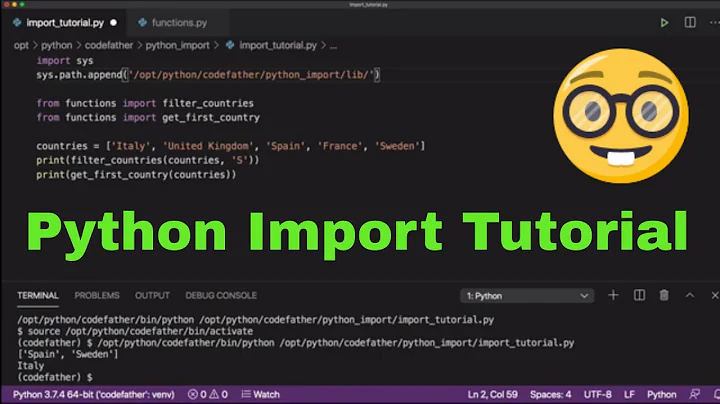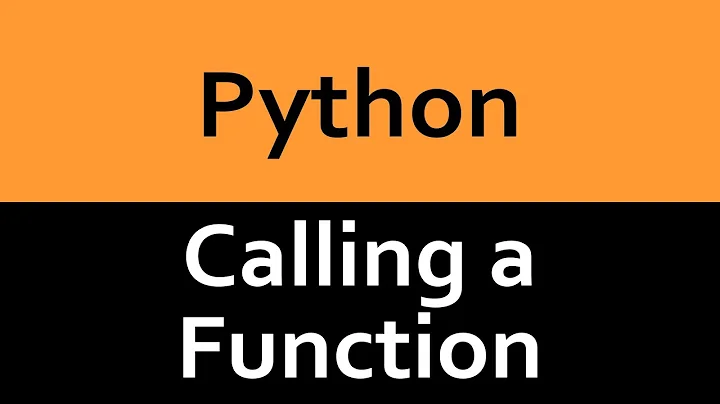Declare function at end of file in Python
Solution 1
One way that is sort of idiomatic in Python is writing:
def main():
print Kerma()
def Kerma():
return "energy / mass"
if __name__ == '__main__':
main()
This allows you to write you code in the order you like as long as you keep calling the function main at the end.
Solution 2
When a Python module (.py file) is run, the top level statements in it are executed in the order they appear, from top to bottom (beginning to end). This means you can't reference something until you've defined it. For example the following will generate the error shown:
c = a + b # -> NameError: name 'a' is not defined
a = 13
b = 17
Unlike with many other languages, def and class statements are executable in Python—not just declarative—so you can't reference either a or b until that happens and they're defined. This is why your first example has trouble—you're referencing the Kerma() function before its def statement has executed and body have been processed and the resulting function object bound to the function's name, so it's not defined at that point in the script.
Programs in languages like C++ are usually preprocessed before being run and during this compilation stage the entire program and any #include files it refers to are read and processed all at once. Unlike Python, this language features declarative statements which allow the name and calling sequence of functions (or static type of variables) to be declared (but not defined), before use so that when the compiler encounters their name it has enough information to check their usage, which primarily entails type checking and type conversions, none of which requires their actual contents or code bodies to have been defined yet.
Solution 3
This isn't possible in Python, but quite frankly you will soon find you don't need it at all. The Pythonic way to write code is to divide your program into modules that define classes and functions, and a single "main module" that imports all the others and runs.
For simple throw-away scripts get used to placing the "executable portion" at the end, or better yet, learn to use an interactive Python shell.
Solution 4
If you are willing to be like C++ and use everything inside a functions. you can call the first function from the bottom of the file, like this:
def main():
print("I'm in main")
#calling a although it is in the bottom
a()
def b():
print("I'm in b")
def a():
print("I'm in a")
b()
main()
That way python is first 'reading' the whole file and just then starting the execution
Solution 5
Python is a dynamic programming language and the interpreter always takes the state of the variables (functions,...) as they are at the moment of calling them. You could even redefine the functions in some if-blocks and call them each time differently. That's why you have to define them before calling them.
Related videos on Youtube
TheGentleOne
Updated on July 26, 2021Comments
-
TheGentleOne almost 3 years
Is it possible to call a function without first fully defining it? When attempting this I get the error: "function_name is not defined". I am coming from a C++ background so this issue stumps me.
Declaring the function before works:
def Kerma(): return "energy / mass" print Kerma()However, attempting to call the function without first defining it gives trouble:
print Kerma() def Kerma(): return "energy / mass"In C++, you can declare a function after the call once you place its header before it.
Am I missing something here?
-
user1066101 over 13 yearsIn Python there's no "declare". There's the definition (which must be complete) or there's nothing.
-
Thomas over 13 yearsYou say, "it gives trouble". Can you elaborate on that?
-
user over 7 yearsPossible duplicate of Declaration functions in python after call
-
anon about 7 yearsIn case anyone is wondering:
Kerma is an acronym for "kinetic energy released per unit mass" -
Kyle about 7 yearsI know this is super old, but why has no one recommended putting the functions in a separate
.pyfile and importing that? Is there some unintended consequences? -
NoName almost 5 years@Kyle Importing just pastes the imported code before the current code at compile time, so it's the same as defining the functions in the current code before calling them xD
-
Kyle almost 5 years@NoName learn something new everyday! Thanks for the info.
-
 gseattle about 3 yearsA vast oversight in python, it should read the file before executing so all functions are available, suggest they fix it fer pete's sake in 4x
gseattle about 3 yearsA vast oversight in python, it should read the file before executing so all functions are available, suggest they fix it fer pete's sake in 4x -
 Melvin Calvin over 2 years@NoName It is not the same from a coder's POV while editing. The script is easier to manage.
Melvin Calvin over 2 years@NoName It is not the same from a coder's POV while editing. The script is easier to manage.
-
-
Eli Bendersky over 13 years@Muhammad: while this is a viable approach, it surely isn't idiomatic in Python. Quite the opposite, you'll notice most
mainfunctions are usually placed at the end. -
user1066101 over 13 years@Eli Bendersky: I'd submit that the
if __name__ == '__main__':switch is the common idiomatic part. -
yantrab over 13 years@Eli: the idiomatic part is the if clause at the end: no code at the top level of the module, then at the end invoke a main function if the module is main.
-
Eli Bendersky over 13 years@S.Lott and @Ned: of course, but note Muhammad's sentence after the code sample which specifically points to placing
mainabove and calling it below. Theif __name__part is tangential in that answer, or at least not given attention. -
Muhammad Alkarouri over 13 years@Eli: The idiomatic part is the
if ... __main__':. I didn't say that themainshould be placed above the rest of the code. I said the important part is calling_\_main__at the end, and it doesn't matter where you place its definition then. -
MKesper over 7 yearsWith the if name == 'main': switch it becomes irrelevant how you order your functions. That's the right thing(TM) to do.
-
John Deighan over 4 yearsIt's not that a dynamic language can't do that. Perl is a dynamic language and you can call a function before you define it. That's because it has a compile phase and an execute phase (though oddly, but usefully, you can arrange to execute code during the compile phase). This works:
doit(); sub doit { print("I'm doing it!\n"); } -
Simon Z. over 3 yearsI am confused about the usage. The code fails if I make the
Kerma()to be an inner function. -
 Melvin Calvin over 2 years@SimonZ. you are supposed to do the definition of the function outside the definition of main
Melvin Calvin over 2 years@SimonZ. you are supposed to do the definition of the function outside the definition of main

![[2022] CS50 - (Week 5) Speller Solution | Walkthrough & Guide for Beginners | By Anvea](https://i.ytimg.com/vi/wHUpt71YGeY/hqdefault.jpg?sqp=-oaymwEcCOADEI4CSFXyq4qpAw4IARUAAIhCGAFwAcABBg==&rs=AOn4CLA-f9YbInCGCd25EDtGZhw2dzhYmg)






